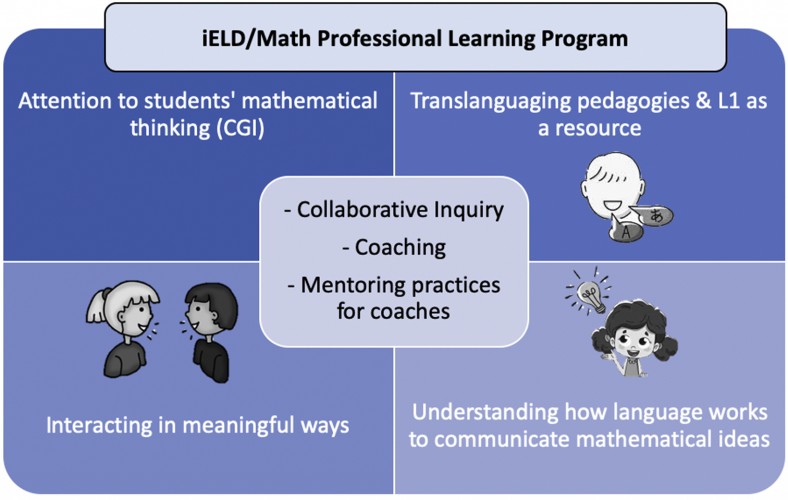Our collaborative, design-based approach to professional learning
will incorporate research-based essential practices for teaching
ELD and Common Core math standards, with a focus on understanding
students’ thinking about fractions and using translanguaging
pedagogies to leverage students’ home language as a valuable
resource for thinking and communicating mathematically. UC Davis
researchers will engage participating practitioners in monthly
cycles of collaborative discussion and learning to deepen
pedagogical knowledge and iteratively design tools and practices
that support integrative teaching and learning.
Content Focus
- Fractions
- Oral language development
- Whole class math discussion

Pedagogical Approaches
Cognitively Guided Instruction (CGI): Equal
sharing, multiple groups, equivalent fractions, operations on
fractions, and decimals
Integrated ELD Math/Local District Strategies:
Constructive Conversation Skills, Three Phase Lesson,
Instructional Approaches
Engaging students in productive language:
Exploring the pedagogical approach of Translanguaging to provide
students opportunities to develop linguistic practices for
academic context in math.
Project Goals
- Develop a deeper understanding of emergent bilinguals’
thinking about mathematical solutions using equal sharing
problems
- Leverage emergent bilinguals’ full repertoire of oral and
written language, with an emphasis on mathematical precision in
conversations with peers
- Integrate culturally sustaining pedagogical practices,
including collaborating with families to support emergent
bilinguals’ language and math identities
The following design leaders will be collaborating with teachers
and coaches in school districts to design teaching practices and
learning experiences that help bilingual students thrive.
Rebecca Ambrose, PhD
Rebecca is a professor at University of California-Davis. She
works with children and their teachers in classrooms to find good
tasks that lead to interesting discussions. She studies the ways
that children use Spanish and English while doing math. She
has worked in schools in Madison, WI, San Diego & Sacramento.
Margarita Jimenez-Silva, PhD
Prof. Margarita Jimenez-Silva’s research focuses on preparing and
supporting teachers to work with culturally and linguistically
diverse learners, especially in addressing emergent bilinguals’
linguistic and academic content development. She has worked with
newcomer students as a middle-school math and science teacher in
Oakland, California, and began her work with pre-service teachers
at Concordia University in Irvine, CA. She herself is a former
English learner from the San Fernando Valley in Southern
California.
Rachel Restani, PhD
Rachel’s experience teaching mathematics in economically and
socially diverse communities motivates her to support teachers in
humanizing the learning experience so that minoritized students
have more agency in the classroom. She recently worked with
teachers and students in New Zealand.
Suzanne Abdelrahim, EDD
Suzanne is a former elementary school teacher and former
researcher with the National Clearinghouse for English Language
Acquisition. Suzanne helps educators to reflect on teaching
practices to improve learning for linguistically and culturally
diverse learners.
Why should students explain their mathematical ideas? Why
should they use ALL their languages to explain?
- Research shows students develop a deeper understanding of
math concepts when they explain their ideas to other people.
- Math explanations can include explaining what you
understand about a problem, how you solved it, and why you think
it works to answer the question.
- Explanations of fractions include many components, such
as explaining what “whole” you’re referring to and the size of
the pieces.
- Communication can and should include using ALL of the
students’ communicative resources to explain complex ideas. This
includes visuals, symbols, manipulatives, and gestures to show
their thinking. It also includes using home languages and
dialects in addition to English.
- When students discuss their ideas in English and their home
language, they have opportunities to develop their bilingualism,
biliteracy, and strong bilingual math identities. They can make
cross-language connections that help them develop in both
languages. They can also further develop their mathematical
understanding by communicating their ideas more fully.
- Students and teachers can work towards communicating in more
and more precise ways, in all their languages.
- We support teachers in learning to attend to students’
thinking, listen deeply for their mathematical
understanding, probe for more detail, and know when the right
time is to push for greater precision in communication. If
we push too soon, it can interrupt students’ mathematical
thinking!